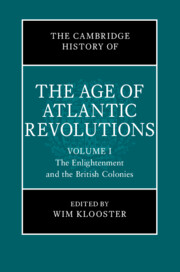Book contents
- The Cambridge History of the Age of Atlantic Revolutions
- The Cambridge History of the Age of Atlantic Revolutions
- The Cambridge History of the Age of Atlantic Revolutions
- Copyright page
- Contents
- Figures
- Maps
- Contributors to Volume i
- Preface
- Introduction
- Part I Enlightenment and Culture
- 1 Enlightenment and the American Revolution
- 2 Enlightenment and the French Revolution
- 3 Enlightenment and the Ibero-American Revolutions
- 4 Cultural Practices and Revolutions, c. 1760–1825
- Part II The British Colonies
- Index
1 - Enlightenment and the American Revolution
from Part I - Enlightenment and Culture
Published online by Cambridge University Press: 20 October 2023
- The Cambridge History of the Age of Atlantic Revolutions
- The Cambridge History of the Age of Atlantic Revolutions
- The Cambridge History of the Age of Atlantic Revolutions
- Copyright page
- Contents
- Figures
- Maps
- Contributors to Volume i
- Preface
- Introduction
- Part I Enlightenment and Culture
- 1 Enlightenment and the American Revolution
- 2 Enlightenment and the French Revolution
- 3 Enlightenment and the Ibero-American Revolutions
- 4 Cultural Practices and Revolutions, c. 1760–1825
- Part II The British Colonies
- Index
Summary
The transatlantic intellectual movement today called “the Enlightenment” took particular forms in British North America during the American Revolution. This essay explores four interlocking Enlightenment concepts as used by eighteenth-century Americans to describe their political revolt against British monarchical rule: nature, progress, reason, and revolution. Americans appealed to nature to delegitimize claims to authority that rested on history, custom, divine access, and lineage. Dispensing with cyclical ideas of history and decline narratives from the Bible, they invented the new idea of progress as a way to describe social and political improvements resulting from human reason. They described reason, in turn, as a distinct mode of knowledge resulting from sensory data, opposing it to knowledge resting on belief or the passions alone. Finally, they described their own break with Britain as a revolution because it seemed to show the reality of progress toward a better world of reason, natural rights, and government by the people. The essay also surveys the historiography on “the American Enlightenment,” a term invented by Americans during the Cold War era amid fears of Soviet-style totalitarianism. Eighteenth-century people themselves spoke of “enlightenment” as a never-ending process rather than a finished project.
Keywords
- Type
- Chapter
- Information
- The Cambridge History of the Age of Atlantic Revolutions , pp. 53 - 79Publisher: Cambridge University PressPrint publication year: 2023



